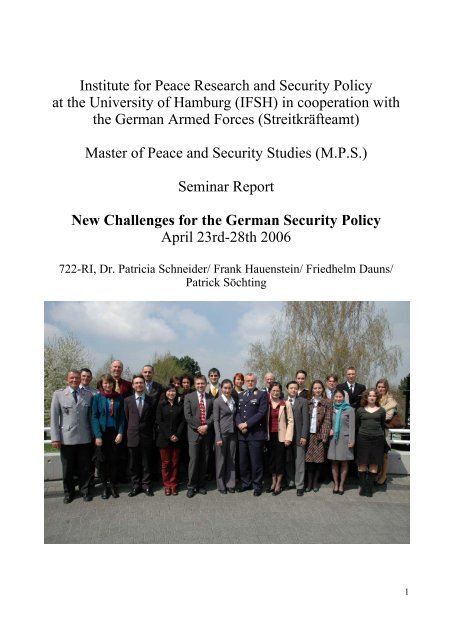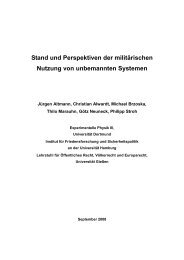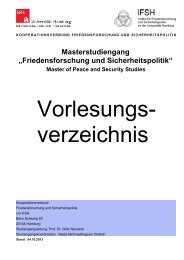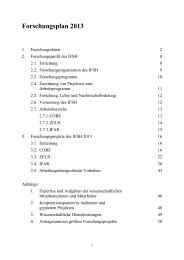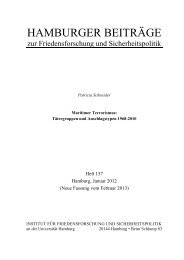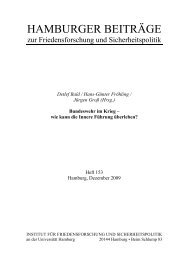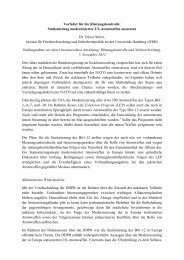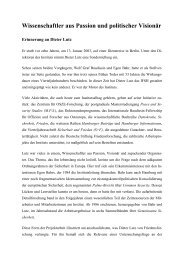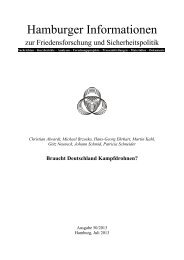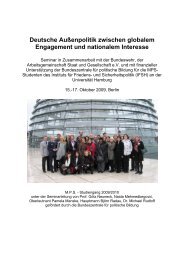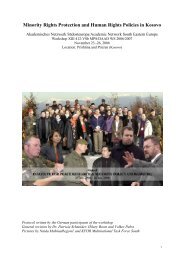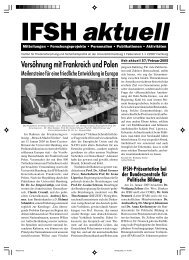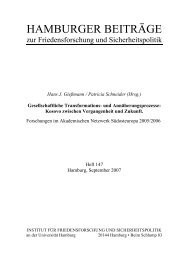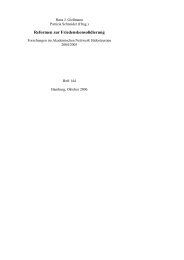New Challenges for the German Security Policy - IFSH
New Challenges for the German Security Policy - IFSH
New Challenges for the German Security Policy - IFSH
Create successful ePaper yourself
Turn your PDF publications into a flip-book with our unique Google optimized e-Paper software.
Institute <strong>for</strong> Peace Research and <strong>Security</strong> <strong>Policy</strong><br />
at <strong>the</strong> University of Hamburg (<strong>IFSH</strong>) in cooperation with<br />
<strong>the</strong> <strong>German</strong> Armed Forces (Streitkräfteamt)<br />
Master of Peace and <strong>Security</strong> Studies (M.P.S.)<br />
Seminar Report<br />
<strong>New</strong> <strong>Challenges</strong> <strong>for</strong> <strong>the</strong> <strong>German</strong> <strong>Security</strong> <strong>Policy</strong><br />
April 23rd-28th 2006<br />
722-RI, Dr. Patricia Schneider/ Frank Hauenstein/ Friedhelm Dauns/<br />
Patrick Söchting<br />
1
Foreword<br />
From April 23 rd to April 28 th 2006 <strong>the</strong> seminar group consisting of numerous students of <strong>the</strong> <strong>IFSH</strong>'s<br />
Master of Peace and <strong>Security</strong> post-graduate program as well as regular students of Hamburg<br />
University participated in an international security policy program supported and organized by <strong>the</strong><br />
<strong>German</strong> Bundeswehr. The group visited several national and international security-related<br />
institutions in <strong>German</strong>y, Belgium an <strong>the</strong> Ne<strong>the</strong>rlands, such as <strong>the</strong> <strong>German</strong> Ministry of Defence in<br />
Bonn, <strong>the</strong> <strong>German</strong> Bundeswehr Centre <strong>for</strong><br />
Verification at Geilenkirchen, NATO's<br />
political Headquarters, and several EU<br />
institutions in Brussels, NATO Air Base<br />
Geilenkirchen, and NATO's Joint Force<br />
Command Headquarters in Brunssum,<br />
Ne<strong>the</strong>rlands.<br />
Apart from that, cultural and social events<br />
were also part of <strong>the</strong> program organized by<br />
Patricia Schneider (<strong>IFSH</strong>), Captain<br />
(<strong>German</strong> Army) Patrick Söchting<br />
(Hamburg), Captain (<strong>German</strong> Army)<br />
Frank Hauenstein and Friedhelm Dauns of<br />
<strong>the</strong> <strong>German</strong> Office of <strong>the</strong> Armed Forces<br />
(Streitkräfteamt St. Augustin).<br />
Major topics of <strong>the</strong> seminar were <strong>the</strong> challenges that <strong>German</strong> and<br />
international security policy are facing at <strong>the</strong> beginning of <strong>the</strong> 21 st<br />
century, <strong>for</strong> example <strong>the</strong> trans<strong>for</strong>mation of <strong>the</strong> Bundeswehr, <strong>the</strong> European<br />
<strong>Security</strong> and Defence <strong>Policy</strong> (ESDP) as well as <strong>the</strong> present and future of<br />
transatlantic security relations.<br />
The participants all took up <strong>the</strong> chance to engage critically in <strong>the</strong><br />
discussions at <strong>the</strong> end of every presentation and thus contributed to a successful and enjoyable week<br />
in <strong>the</strong> students' academic<br />
curriculum.<br />
The M.P.S. students wish to<br />
thank Frank Hauenstein,<br />
Patricia Schneider, Friedhelm<br />
Dauns and Patrick<br />
Söchting <strong>for</strong> <strong>the</strong> professional<br />
administration and planning<br />
of <strong>the</strong> course.<br />
Christian Hillmer<br />
2
Contents<br />
Foreword...............................................................................................................................2<br />
The In<strong>for</strong>mation- and Media Centre of <strong>the</strong> <strong>German</strong> Armed Forces...............................................4<br />
House of History ....................................................................................................................4<br />
Oberst i.G. Gerd Müller, Streitkräfteamt of <strong>the</strong> <strong>German</strong> Armed Forces: Challenge of In<strong>for</strong>mation<br />
Policies of <strong>the</strong> Armed Forces ...................................................................................................5<br />
Dr. Andrew B. Denison, Director „Transatlantic Networks“: The American Foreign- and <strong>Security</strong><br />
<strong>Policy</strong> and its Meaning <strong>for</strong> Europe ...........................................................................................5<br />
Dr. Aschot Manutscharjan:......................................................................................................6<br />
The Russian Foreign- and <strong>Security</strong> <strong>Policy</strong>.................................................................................6<br />
Dr. Kai Hirschmann, Streitkräfteamt: The <strong>New</strong> <strong>Challenges</strong> of <strong>Security</strong> <strong>Policy</strong> in <strong>German</strong>y ............7<br />
Center <strong>for</strong> Verification of <strong>the</strong> <strong>German</strong> Armed Forces, Geilenkirchen ...........................................8<br />
NATO E-3A Component/AWACS, NATO Airbase Geilenkirchen..............................................9<br />
European Parliament, Brussels...............................................................................................10<br />
European Commission, Brussels ............................................................................................10<br />
European Union Military Staff (EUMS), Brussels....................................................................12<br />
NATO Headquarters, Brussels: „Evolution of NATO into <strong>the</strong> 21 st Century”...............................13<br />
NATO Headquarters, Brussels: Relationships between NATO and <strong>the</strong> Broader Middle East ........13<br />
Briefing and Discussion: Political Trans<strong>for</strong>mation of NATO, NATO Headquarters, Brussels .......14<br />
NATO Joint Force Command, Brunssum, Ne<strong>the</strong>rlands.............................................................15<br />
Federal Ministry of Defence, Bonn: The <strong>German</strong> Armed Forces on Mission...............................15<br />
Federal Ministry of Defence, Bonn.........................................................................................16<br />
3
The In<strong>for</strong>mation- and Media Centre of <strong>the</strong> <strong>German</strong> Armed Forces<br />
April 23, 2006. Location: Gustav-Stresemann-Institut, Bonn<br />
In <strong>the</strong> beginning, Captain Hauenstein (Seminarleitung) and Friedhelm Dauns (Sachbearbeiter<br />
Öffentlichkeitsarbeit) who are in charge of conducting seminars <strong>for</strong> <strong>the</strong> In<strong>for</strong>mations- und<br />
Medienzentrale der Bundeswehr introduced <strong>the</strong>mselves and <strong>the</strong>ir activities briefly.<br />
Second, Mr. Hauenstein in<strong>for</strong>med us briefly about <strong>the</strong> In<strong>for</strong>mations- und Medienzentrale der<br />
Bundeswehr, which is structured in three divisions: public relations, promoting secondary growth<br />
and troop in<strong>for</strong>mation. In <strong>the</strong> In<strong>for</strong>mations- und Medienzentrale der Bundeswehr archives of<br />
photographs and films of <strong>the</strong> Bundeswehr as well as of <strong>the</strong> NVA (Nationale Volksarmee) are<br />
stored.<br />
Third, after some time <strong>for</strong> first questions, we watched <strong>the</strong> film “Entschieden für Frieden, 50 Jahre<br />
Bundeswehr”. Its main message was that <strong>the</strong> Bundeswehr’s role changed since <strong>the</strong> reunification<br />
from <strong>the</strong> defense of its own and <strong>the</strong>ir allies’ frontiers to deployments abroad in cooperation with<br />
NATO (North Atlantic Treaty Organisation) and UN (United Nations Organisation). The first<br />
fighting mission of <strong>the</strong> Bundeswehr in <strong>the</strong> Balkans in 1993 represents a landmark in <strong>the</strong> history of<br />
<strong>the</strong> Federal Republic of <strong>German</strong>y and of its Armed Forces. Two conditions must be fulfilled <strong>for</strong> a<br />
fighting mission to be called constitutional: There must be a UN mandate and <strong>the</strong> parliament must<br />
have given green light <strong>for</strong> this certain action. What <strong>the</strong>n followed were <strong>the</strong> most important historical<br />
developments of <strong>the</strong> Bundeswehr between 1955, when <strong>the</strong> main goal was to have an army which<br />
would be so strong that <strong>the</strong> risk to be attacked by <strong>the</strong> Soviets was as low as possible, and 2005,<br />
when <strong>the</strong> Bundeswehr is at eye level with <strong>the</strong> o<strong>the</strong>r <strong>for</strong>ces in NATO. The challenge <strong>for</strong> <strong>the</strong><br />
Bundeswehr since 1989/90 is to trans<strong>for</strong>m itself. In a first step, troops of <strong>the</strong> <strong>for</strong>mer <strong>German</strong><br />
Democratic Republic Armed Forces (National People’s Army, Nationale Volksarmee (NVA)) had<br />
to be integrated into <strong>the</strong> Bundeswehr and <strong>the</strong> total number of soldiers had to be reduced. In a second<br />
step, <strong>the</strong> whole Bundeswehr had to be trans<strong>for</strong>med into effectively working Armed Forces which<br />
must be simultaneously ready to have fighting missions and to per<strong>for</strong>m humanitarian missions.<br />
House of History<br />
Andrea Pretis<br />
April 23, 2006, Bonn<br />
The second item on <strong>the</strong> arrival day was a visit at <strong>the</strong> Haus der Geschichte (House of History). The<br />
museum, opened in 1994, offers a permanent exhibition displaying <strong>the</strong> <strong>German</strong> history from 1945<br />
up to now. 4,000 square meters and 6,000 historical objects were awaiting us. In <strong>the</strong> entrance hall,<br />
two skilled and charming guides divided us in two groups and led us through <strong>the</strong> fascinating world<br />
of <strong>the</strong> past <strong>for</strong> one hour and a half. The journey began on <strong>the</strong> ground floor with <strong>the</strong> end of World<br />
War II. The impression of this difficult period of time streng<strong>the</strong>ned our guide by narrating his own<br />
memories as a child born during <strong>the</strong> war. Slowly we worked our way up to <strong>the</strong> top crossing<br />
decades with each floor. On <strong>the</strong> second floor we watched <strong>German</strong>y recovering itself from <strong>the</strong> war<br />
catastrophe and establishing democracy. The next levels showed <strong>the</strong> progression of <strong>the</strong> Cold War<br />
Era and its impact on <strong>the</strong> rest of <strong>the</strong> world, especially Eastern Europe. At <strong>the</strong> same time, we could<br />
admire <strong>the</strong> material and technical achievements of <strong>the</strong> proceeding 20 th century. Finally <strong>the</strong> last level<br />
was reached and <strong>the</strong>rewith <strong>the</strong> fall of <strong>the</strong> Iron Curtain, <strong>German</strong> reunification and <strong>the</strong> current period<br />
of history. The present day exposition is characterised by <strong>the</strong> challenges and commitments of <strong>the</strong><br />
globalised world. What will <strong>the</strong> new historical era look like and what will we find in <strong>the</strong> exhibition<br />
rooms of Haus der Geschichte in <strong>the</strong> coming years depends on how <strong>the</strong>se challenges will be coped.<br />
Karolina Zázvorková<br />
4
Oberst i.G. Gerd Müller, Streitkräfteamt of <strong>the</strong> <strong>German</strong> Armed<br />
Forces: Challenge of In<strong>for</strong>mation Policies of <strong>the</strong> Armed Forces<br />
April 24, 2006, Gustav-Stresemann-Institut, Bonn.<br />
On <strong>the</strong> occasion of <strong>the</strong> first 'official' presentation of <strong>the</strong> journey, Colonel Gerd Müller, head of<br />
section of <strong>the</strong> Public In<strong>for</strong>mation Department in <strong>the</strong> Office of <strong>the</strong> <strong>German</strong> Armed Forces<br />
(Streitkräfteamt), gave an insight into his department's work and structures, naming its three main<br />
operational fields: Public Relations („Öffentlichkeitsarbeit“), Public In<strong>for</strong>mation Service<br />
(„In<strong>for</strong>mationsservice“), and Internal In<strong>for</strong>mation („Truppenin<strong>for</strong>mation“).<br />
In <strong>the</strong> second part of his presentation, Colonel Müller discussed examples of controversial political<br />
topics that characterise <strong>the</strong> difficult relations between armed <strong>for</strong>ces, media and <strong>the</strong> public: The<br />
export of Eurofighter Aircraft to an instable region or country <strong>for</strong> instance – which is an exclusive<br />
matter of economic export regulation politics and <strong>the</strong> <strong>German</strong> aircraft industry – would usually be<br />
perceived as a <strong>German</strong> Bundeswehr topic by <strong>the</strong> public and thus cause negative associations with<br />
<strong>the</strong> military, although <strong>the</strong> Bundeswehr is not involved in such an economic process.<br />
Describing current challenges to <strong>the</strong> Bundeswehr's in<strong>for</strong>mation policy, Colonel Müller focussed on<br />
three main issues characterizing today's Bundeswehr:<br />
Above all, <strong>the</strong> Bundeswehr considers itself as a parliamentary <strong>for</strong>ce which is strictly committed to<br />
its constitutional framing and acts on <strong>the</strong> basis of <strong>the</strong> Defense Ministry's 2003 Agenda<br />
(Verteidigungspolitische Richtlinien). In addition, <strong>the</strong> strict limits of <strong>the</strong> budgetary resources<br />
provided by <strong>the</strong> legislative <strong>German</strong> Bundestag make up a big challenge to military planners.<br />
Secondly, <strong>the</strong> <strong>German</strong> Bundeswehr is currently undergoing its most influential restructuring process<br />
called <strong>the</strong> „Trans<strong>for</strong>mation der Bundeswehr“, which is aiming at more effective <strong>for</strong>ces prepared <strong>for</strong><br />
both peacekeeping and peace-en<strong>for</strong>cing missions.<br />
The third and final issue determining <strong>the</strong> Bundeswehr's daily business is designated by its numerous<br />
international peacekeeping missions such as EUFOR in Bosnia, ISAF in Afghanistan, KFOR in<br />
Kosovo, or <strong>the</strong> planned EU Mission to <strong>the</strong> Democratic Republic of Congo.<br />
In<strong>for</strong>mation – as Colonel Müller put it – is a key factor <strong>for</strong> <strong>the</strong> effectiveness of Armed Forces,<br />
especially in open societies with a quick flow of in<strong>for</strong>mation. As a result, in<strong>for</strong>mation work with<br />
armed <strong>for</strong>ces requires well-trained personnel and comprising awareness of <strong>the</strong> public and political<br />
situation abroad as well as within <strong>German</strong>y.<br />
A lively and very controversial discussion arose in <strong>the</strong> context Colonel Müller's statements<br />
concerning <strong>the</strong> <strong>German</strong> Air <strong>Security</strong> Act („Luftsicherheitsgesetz“), which was rejected by <strong>the</strong><br />
<strong>German</strong> Supreme Constitutional Court just recently.<br />
Dalma Fabian, Christian Hillmer<br />
Dr. Andrew B. Denison, Director „Transatlantic Networks“: The<br />
American Foreign- and <strong>Security</strong> <strong>Policy</strong> and its Meaning <strong>for</strong> Europe<br />
April 24, 2006, Gustav-Stresemann-Institut, Bonn.<br />
Dr. Andrew B. Denison, Director of „Transatlantic Network“, mapped out, in terms of political<br />
science, a realistic picture of transatlantic relations. Thereby he consistently used Robert Kagans<br />
ideas of <strong>the</strong> USA acting in a Hobbes-like world and Europe aspired to peace in <strong>the</strong> spirit of Kant.<br />
Moreover he described <strong>the</strong> transatlantic community as well, consisting of common prosperity,<br />
freedom, peace and partnership. According to Dr. Denison <strong>the</strong> dominant challenges to this<br />
partnership are proliferation of weapons of mass destruction to non-state actors and <strong>the</strong> protection<br />
5
of <strong>the</strong> liberty order not to be sacrificed <strong>for</strong> security reasons and <strong>the</strong> protection of civil liberty laws<br />
facing <strong>the</strong> danger of being sacrificed <strong>for</strong> security reasons. Dension stated<br />
three main cultural and political values <strong>for</strong>med by <strong>the</strong> United States in its<br />
history: First <strong>the</strong> belief that only limited state power is good state power,<br />
second <strong>the</strong> freedom to preferring cooperation and coalition <strong>for</strong> practical<br />
reasons ra<strong>the</strong>r than treaties under international law, and third economical<br />
pragmatism, a world <strong>the</strong>atre as marketplace <strong>for</strong> gaining profit.<br />
Transatlantic relationship gives limited opportunity to Europeans to influence<br />
US policy. Dr. Denison illustrated, that strong economical bindings are a<br />
common ground, although <strong>the</strong>re are some communication problems leading<br />
to misunderstandings. To prevent a friction between Europe and America in<br />
<strong>the</strong> long run political burdens have to be borne and shared commonly. A<br />
more explicit affirmation of US policy could consolidate <strong>the</strong> decreased<br />
European influence, at <strong>the</strong> same time Europe should increasingly focus its policy on <strong>the</strong> world<br />
outside <strong>the</strong> continent. The challenges of <strong>the</strong> 21 th century could only be faced toge<strong>the</strong>r by Europe and<br />
<strong>the</strong> United States.<br />
In <strong>the</strong> following discussion <strong>the</strong> sustainability of US policy, especially with regard to <strong>the</strong><br />
proliferation crisis in Iran, <strong>the</strong> post war situation in Iraq and <strong>the</strong> vision of US administrators of a<br />
united Europe, which is not <strong>the</strong> same as in Europe itself, and <strong>the</strong> political<br />
power of <strong>the</strong> military economical complex were discussed briefly.<br />
Dr. Aschot Manutscharjan:<br />
The Russian Foreign- and <strong>Security</strong> <strong>Policy</strong><br />
April 24, 2006, Gustav-Stresemann-Institut, Bonn.<br />
Dr. Manutscharjan, born citizen of <strong>the</strong> <strong>for</strong>mer part of <strong>the</strong> Soviet<br />
Union Armenia, works as freelance journalist <strong>for</strong> several<br />
scientific and well known journals and newspapers. He gave a<br />
speech about <strong>the</strong> Russian <strong>for</strong>eign and security policy. With his<br />
directly connected view to historical and recent developments in<br />
Russia he spoke not only about scientific values but also about<br />
his personal experience and observations within <strong>the</strong> breakdown<br />
of <strong>the</strong> Sowjet Union and <strong>the</strong> development of <strong>the</strong> Russian <strong>Policy</strong>.<br />
Irakli Sesiashvili, Dr. Marcel Dickow<br />
At first he provided in<strong>for</strong>mation about <strong>the</strong> historical development of Russia in <strong>the</strong> 1990ies. He<br />
analysed <strong>the</strong> circumstances of <strong>the</strong> end of <strong>the</strong> Cold War and <strong>the</strong> relations between <strong>the</strong> Western and<br />
<strong>the</strong> Eastern World. Thereby he described various political frictions of <strong>the</strong> breakdown of <strong>the</strong> Soviet<br />
Union and <strong>the</strong> <strong>for</strong>mation of <strong>the</strong> so called east-block countries.<br />
Fur<strong>the</strong>rmore he concentrated on <strong>the</strong> Russian policy of <strong>the</strong> last 15 years and focused on <strong>the</strong> political<br />
leadership of Vladimir Putin and additionally <strong>the</strong> political, social and economic development of <strong>the</strong><br />
Russia in that context. Accordingly, <strong>the</strong> speaker took a closer look to <strong>the</strong> political relations between<br />
Russia and <strong>the</strong> United States of America by turning his attention to <strong>the</strong> interests - in <strong>the</strong> broadest<br />
sense - of both countries in <strong>the</strong> Middle East .<br />
During <strong>the</strong> speech of Mr. Manutscharjan, his audience questioned him about various points in his<br />
explanations, especially about <strong>the</strong> future perspectives and possible developments of Russia and its<br />
policy. Overall <strong>the</strong> speech of Mr Manutscharjan was very in<strong>for</strong>mative and clearly structured. He<br />
covered <strong>the</strong> topic with his personal experiences as a journalist and citizen. Students liked most that<br />
he was talking plain language. The students learned to develop a critical view towards <strong>the</strong> Russian<br />
6
policy.<br />
Irakli Sesiashvili, Anne-Katrin Stahn<br />
Dr. Kai Hirschmann, Streitkräfteamt: The <strong>New</strong> <strong>Challenges</strong> of<br />
<strong>Security</strong> <strong>Policy</strong> in <strong>German</strong>y<br />
April 24, 2006, Gustav-Stresemann-Institut, Bonn.<br />
Dr. Kai Hirschmann’s presentation of <strong>the</strong> new challenges <strong>for</strong> <strong>the</strong> <strong>German</strong> security politics focused<br />
on two central topics: failed states and terrorism, which are closely interrelated phenomena.<br />
Hirschmann divided his presentation into three parts:<br />
- introductory definitions and preconditions of failed states and terrorism (including<br />
preconditions and tendencies, future conflict scenarios);<br />
- Islamism and Jihadism as a worldwide ideology (including developing lines of Islamism, <strong>the</strong><br />
3-2-1-model of violence);<br />
- manifestations of this ideology: from <strong>the</strong>ory to practical issues (including <strong>the</strong> role of Al-<br />
Qaeda as <strong>the</strong> provider organization to <strong>the</strong> international Jihad network).<br />
Hirschmann started by distinguishing between terrorists on one hand<br />
and guerilla or freedom fighters on <strong>the</strong> o<strong>the</strong>r. According to<br />
Hirschmann, terrorism uses violence driven by political motivations. It<br />
aims at a change of behavior/politics on <strong>the</strong> part of <strong>the</strong> enemy:<br />
“Guerillas want to conquer <strong>the</strong> land, terrorists <strong>the</strong> brain and <strong>the</strong><br />
thinking.”<br />
Hirschmann distinguished between old and new challenges, <strong>the</strong><br />
classical war between states and <strong>the</strong> conflicts in which at least one<br />
party is sub-governmental. He brought up <strong>the</strong> question why states are failing. Important<br />
preconditions date back to colonial times, when border lines were drawn without taking into<br />
account ethnic communities, religious affiliations or o<strong>the</strong>r historically grown divides. Examples are<br />
legion, Hirschmann named Nigeria, Iraq and Pashtunistan (Durand-Line). O<strong>the</strong>r important factors<br />
in failing states are governments that lack legitimacy as well as one ethnic group dominating o<strong>the</strong>rs.<br />
Yugoslavia and also Afghanistan serve as o<strong>the</strong>r examples <strong>for</strong> rivalry between local leaders<br />
(Milosevic, Karadzic) or war lords (Dostum, Chan), who all had a vital political and economical<br />
interest. O<strong>the</strong>r states disintegrated as a result of <strong>the</strong> regime being undermined by organized crime<br />
and mafia structures. In this respect <strong>the</strong> Islamism of Usama Bin Laden and Mohammed Al-<br />
Zakharwi sticks out because it is almost purely based on a political background (with religious<br />
justification).<br />
The second part of <strong>the</strong> presentation dealt with Islamism, Jihadism and sectarian ideologies of<br />
minorities that misuse and misinterpret Islamic tradition in order to achieve political goals. These<br />
groups are to be distinguished clearly from <strong>the</strong> Islam itself.<br />
Hirschmann <strong>the</strong>n explained <strong>the</strong> 3-2-1-model of violence as a justification of Islamic terrorism: 3<br />
enemies (<strong>the</strong> crusaders, <strong>the</strong> Jews and <strong>the</strong> governments cooperating with <strong>the</strong> infidel western nations)<br />
have to be attacked by two different means (physical and mental: through soldiers and through<br />
<strong>for</strong>cing schemes of behavior onto <strong>the</strong> enemies), and <strong>the</strong>re is only one answer: <strong>the</strong> common defense<br />
ef<strong>for</strong>t, which Islamists often call “Jihad”. The originator of this line of thought was said to be a man<br />
named Sayed Kutub, an Egyptian middle school teacher, executed in 1966. According to<br />
Hirschmann “Jihad” cannot be translated by “Holy war” but by “striving”.<br />
The end of <strong>the</strong> presentation was marked by a couple of questions aiming at <strong>the</strong> 3-2-1-model, <strong>the</strong><br />
difference between Hamas and Jihad, <strong>the</strong> financial sources of Al-Qaeda, <strong>the</strong> parallels between<br />
Afghanistan, Chechnya, Iraq and Bosnia-Herzegovina and terrorism research in <strong>German</strong>y.<br />
Thomas Wagner, Frank Reininghaus<br />
7
Center <strong>for</strong> Verification of <strong>the</strong> <strong>German</strong> Armed Forces, Geilenkirchen<br />
April 25, 2006<br />
During our visit at <strong>the</strong> Bundeswehr Verification Center, on Tuesday <strong>the</strong> 25th of April 2006, we had<br />
<strong>the</strong> opportunity to hear about <strong>the</strong> activity of <strong>the</strong> Verification Center, in general and about <strong>the</strong> main<br />
treaties and international conventions on arms control and non-proliferation.<br />
The Bundeswehr Verification Center is responsible <strong>for</strong><br />
checking whe<strong>the</strong>r <strong>the</strong> States parties have met or not met<br />
<strong>the</strong>ir disarmament obligations comprised in 19<br />
international treaties and conventions. The main treaties<br />
are divided into regional arms control treaties like <strong>the</strong><br />
Treaty on Conventional Forces in Europe (CFE), <strong>the</strong><br />
Vienna Document (1999) and <strong>the</strong> Open Skies Treaty, as<br />
well as treaties prohibiting certain arms like “Small Arms<br />
and Light Weapons” (SALW), <strong>the</strong> Ban on Anti-Personnel<br />
Mines, <strong>the</strong> UN Weapons Convention, as well as non<br />
proliferation treaties like <strong>the</strong> Chemical Weapons<br />
Convention, <strong>the</strong> Biological Weapons Convention, <strong>the</strong><br />
Hague International Code of Conduct (HCoC), <strong>the</strong><br />
upcoming Comprehensive Test Ban Treaty (CTBT) or <strong>the</strong><br />
Missile Technology Control Regime (MTCR).<br />
<strong>German</strong>y is leading about 400 inspections annually,<br />
accompanies fur<strong>the</strong>r 700 and accepts some 500 inspections<br />
in its own territory. There is an unofficial agreement<br />
regarding <strong>the</strong> CFE, that NATO member states do not<br />
control <strong>the</strong>mselves. The inspections focus on Russia,<br />
Belarus, Ukraine, <strong>the</strong> Balkans, Caucasus and Central Asia.<br />
The procedure of <strong>the</strong> inspections con<strong>for</strong>ms to <strong>the</strong> principle<br />
of declaration and verification.<br />
In <strong>the</strong> discussion <strong>the</strong> questions aimed at <strong>the</strong> efficiency of <strong>the</strong> different treaties and conventions.<br />
Some of <strong>the</strong> main treaties, like <strong>the</strong> CTBT or <strong>the</strong> adapted CFE had not yet entered into <strong>for</strong>ce as some<br />
important nuclear powers refuse to ratify it because of political (e.g. USA, India, Pakistan, Israel) or<br />
technical (e.g. Russia) reasons. Never<strong>the</strong>less, all international treaties and conventions regarding<br />
arms control and non-proliferation depend on <strong>the</strong> consensus of <strong>the</strong> participating states to respect <strong>the</strong><br />
agreements entered into. O<strong>the</strong>r questions regarded <strong>the</strong> fight against international terrorism and its<br />
consequences <strong>for</strong> <strong>the</strong> disarmament policy, which changed <strong>the</strong> mission of <strong>the</strong> Bundeswehr<br />
Verification Center. Its focus is now to ensure <strong>the</strong> non-proliferation of weapons and means of mass<br />
destruction, to extend <strong>the</strong> international arms control system and to stabilise confidence building<br />
between governments. Although several raised topics were still admittedly as problematic at <strong>the</strong><br />
moment, such as <strong>the</strong> gigantic storage in conventional ammunition, defective storage and<br />
maintenance of ammunition in <strong>the</strong> case of security risks of organized crimes or terrorism, <strong>the</strong> new<br />
mandate is reflected in <strong>the</strong> overall concept of <strong>the</strong> Verification Center: “Verification is our mandate,<br />
confidencebuilding is our aim and cooperation is our way to achieve it”.<br />
Dr. Marcel Dickow, Teodora Aurora Vrancean, Zhixian Xu<br />
8
NATO E-3A Component/AWACS, NATO Airbase Geilenkirchen<br />
April 25, 2006<br />
On Tuesday <strong>the</strong> 25th of April 2006 <strong>the</strong> group<br />
visited <strong>the</strong> NATO Air Base in Geilenkirchen<br />
which is <strong>the</strong> E-3A Component´s main<br />
operating base. O<strong>the</strong>r operating bases are<br />
located in Konya (Turkey), Preveza (Greece),<br />
Trapani (Italy) and Oerland (Norway). After a<br />
brief introduction to <strong>the</strong> site that is <strong>the</strong> place of<br />
work <strong>for</strong> around 3000 military and civilian<br />
personnel and after lunch in <strong>the</strong> officer´s club,<br />
a presentation made <strong>the</strong> group familiar with <strong>the</strong><br />
origins, <strong>the</strong> organisation, <strong>the</strong> missions, tasks<br />
and operations of <strong>the</strong> Component as well as<br />
some technical aspects related to E-3A<br />
operational activities.<br />
The NATO E-3A aircraft – modified Boeing 707s – are flown by integrated multinational crews<br />
from 12 nations, 17 women and men per aircraft. E-3A`s mission is “to provide a fully integrated,<br />
interoperable, multinational and immediately available airborne surveillance warning and control<br />
capability in support of Alliance objectives.” NATO´s Airborne Warning and Control System<br />
(AWACS) plays a crucial role <strong>for</strong> <strong>the</strong> Alliance; whilst conducting a broad range of missions, its<br />
major task is air surveillance. AWACS´ special radar system is able to detect air traffic at low<br />
altitudes and over large distances. In <strong>the</strong> moment <strong>the</strong> fleet consists of 17 E-3A radar aircraft and<br />
three cargo planes. Originally, in 1978, NATO decided on <strong>the</strong> acquisition of 18 aircraft, one was<br />
destroyed by an accident meanwhile. E-3A`s budget <strong>for</strong> 2005 summed up to more than 250 Mio.<br />
Euro; main contributions come from <strong>the</strong> United States and <strong>German</strong>y.<br />
AWACS supported <strong>for</strong> example operations in <strong>the</strong> Balkans in <strong>the</strong> 1990s as well as in Turkey<br />
following Iraq´s invasion of Kuwait in 1990. NATO AWACS support has also been requested <strong>for</strong><br />
increasing security in <strong>the</strong> course of major public events like <strong>the</strong> Olympic games 2004 in A<strong>the</strong>ns as<br />
well as <strong>the</strong> World Football championship to start in June 2006 in <strong>German</strong>y.<br />
After <strong>the</strong> talk, <strong>the</strong> group watched a short documentary, “24<br />
hours <strong>for</strong> Peace”, illustrating major tasks and activities of<br />
NATO E-3A. The film focused on <strong>the</strong> daily life of <strong>the</strong><br />
personnel; it showed some manoeuvre scenes as well as <strong>the</strong><br />
difficult process of air refueling.<br />
Finally all seminar participants had <strong>the</strong> chance of inspecting<br />
an E-3A aircraft from <strong>the</strong> inside. Experts guided small groups<br />
through <strong>the</strong> aircraft, gave technical in<strong>for</strong>mation, explained <strong>the</strong><br />
crew´s various positions and tasks and answered <strong>the</strong> groups´<br />
questions.<br />
Zhixian Xu, Thomas Wagner<br />
9
European Parliament, Brussels<br />
April 26, 2006<br />
The group of visitors had <strong>the</strong> opportunity to meet <strong>the</strong> Vice-President of <strong>the</strong> European Parliament<br />
Mrs. Dr. Sylvia-Yvonne Kaufmann and to talk with her about current problems and challenges of<br />
<strong>the</strong> Parliament and of <strong>the</strong> European Union.<br />
Dr. Kaufmann welcomed <strong>the</strong> group in a conference room<br />
and introduced herself and her major activities as a Vice-<br />
President of <strong>the</strong> European Parliament. She started her<br />
political career in <strong>the</strong> <strong>German</strong> party “Partei des<br />
Demokratischen Sozialismus”(PDS) and was a member of<br />
<strong>the</strong> PDS Executive in <strong>the</strong> period 1991-1993 and 2000-<br />
2002. In addition Mrs. Dr. Kaufmann was a Federal Vice-<br />
Chair of PDS between 1993 and 2000. She had an observer<br />
status at <strong>the</strong> European Parliament in <strong>the</strong> period 1991-1994<br />
and later on in 1999 she became a member of it as a deputy<br />
of <strong>the</strong> Confederal Group of <strong>the</strong> European United Left –<br />
Nordic Green Left. Dr. Kaufmann was also member of three core delegations and respective<br />
commissions: Convention <strong>for</strong> <strong>the</strong> Charter of Human Rights of <strong>the</strong> EU, Vice-Chair of <strong>the</strong> European<br />
Parliament delegation (2000) and Constitutional convention<br />
(2002-2003).<br />
Mrs. Kaufmann pointed out <strong>the</strong> relevance of <strong>the</strong> work of <strong>the</strong><br />
Constitutional Convention and expressed her personal<br />
disappointment with <strong>the</strong> two refusals of <strong>the</strong> European<br />
Constitution in France and in <strong>the</strong> Ne<strong>the</strong>rlands. She offered<br />
various possible explanations and explained <strong>the</strong> resulting<br />
dilemma <strong>for</strong> <strong>the</strong> EU. The Vice-President did not support <strong>the</strong><br />
general redefinition of <strong>the</strong> content of <strong>the</strong> Constitution since<br />
this will take ano<strong>the</strong>r couple of years to be completed, because <strong>the</strong> constitution already reflects a lot<br />
of bargaining, compromise and “package deals”. She stressed <strong>the</strong> importance of <strong>the</strong> EU<br />
Constitution <strong>for</strong> <strong>the</strong> future of Europe. She also outlined <strong>the</strong> shortcomings of EU’s visa and data<br />
security policy. She saw no chance <strong>for</strong> Russia in <strong>the</strong> near future to enter <strong>the</strong> European Union.<br />
Concerning <strong>the</strong> CIA-Committee of <strong>the</strong> EU Parliament, Dr. Kaufmann revealed that <strong>the</strong>re were<br />
several cases of abduction of European citizens through <strong>the</strong> US CIA-agents and made clear that <strong>the</strong><br />
EU Parliament would undertake a thorough investigation about it.<br />
Alexander Tsukev, Qin Yunfeng<br />
European Commission, Brussels<br />
April 26, 2006<br />
Mrs. Trautmann from <strong>the</strong> external speaker team provided us with a warm welcome and an<br />
introduction to <strong>the</strong> European Commission. She started with <strong>the</strong> challenges of work at <strong>the</strong><br />
Commission and <strong>the</strong>re<strong>for</strong>e, gave us an interesting insight into daily life at <strong>the</strong> Commission. Apart<br />
from <strong>the</strong> many languages present at <strong>the</strong> Commission, cultural diversity plays an important role –<br />
creating challenges and making work more interesting at <strong>the</strong> same time. Responding to questions<br />
raised by <strong>the</strong> group, Mrs. Trautmann explained <strong>the</strong> role of interpreters and translators at <strong>the</strong> EU<br />
institutions. Ano<strong>the</strong>r aspect raised by <strong>the</strong> group was <strong>the</strong> chance of employment at <strong>the</strong> European<br />
Commission. Here Mrs. Trautmann spoke freely about <strong>the</strong> enrollment process and <strong>the</strong> difficulties<br />
<strong>for</strong> applicants without working experience.<br />
10
In <strong>the</strong> following, she presented <strong>the</strong> work of <strong>the</strong> European organs. It is difficult to actually define <strong>the</strong><br />
EU, <strong>for</strong> it is nei<strong>the</strong>r a state nor a loose federation of states. In terms of economics, <strong>the</strong> EU is more<br />
intertwined than <strong>the</strong> United States and Canada; in terms of politics though it is far away from<br />
<strong>for</strong>ming a unity. Never<strong>the</strong>less, no market can survive without political and legal foundations and<br />
thus, <strong>the</strong> EU politics are more and more touching ra<strong>the</strong>r sensitive areas of national politics and<br />
sovereignty. There<strong>for</strong>e, <strong>the</strong> constant balancing between state and EU interests is <strong>the</strong> main conflict<br />
<strong>the</strong> EU institutions have to manage. The European Council is representing <strong>the</strong> interests of <strong>the</strong><br />
member states, whereas <strong>the</strong> European Parliament represents <strong>the</strong> European people. The Commission<br />
takes care of <strong>the</strong> interests of <strong>the</strong> EU. It is not surprising that sometimes all <strong>the</strong> three institutions are<br />
working on <strong>the</strong> same topics – according to <strong>the</strong>ir competences and interests.<br />
Mrs. Trautmann <strong>the</strong>n concentrated on <strong>the</strong> Commissioners: first, <strong>the</strong> EU Parliament needs to approve<br />
<strong>the</strong> Commissions president and <strong>the</strong>n <strong>the</strong> national governments present <strong>the</strong>ir candidate to <strong>the</strong><br />
Parliament. The Parliament can only approve or disapprove <strong>the</strong> Commission as a whole. Although<br />
<strong>the</strong> candidates are selected by <strong>the</strong>ir national governments, it is important to note that <strong>the</strong>y are<br />
expected to act independently – integrity towards <strong>the</strong> EU is considered <strong>the</strong>ir most important asset.<br />
Manipulations of commissioners by <strong>the</strong>ir governments are unlikely <strong>for</strong> <strong>the</strong> system and <strong>the</strong> fear of<br />
bad reputation are widely preventing this. In <strong>the</strong> end, <strong>the</strong> discussion dealt with <strong>the</strong> current<br />
Commission and <strong>the</strong> problems and challenges it is facing.<br />
Speaker: Ms. Daniela Tidten, CFSP and ESDP – <strong>New</strong> Developments<br />
Ms. Tidten introduced <strong>the</strong> topic of Common Foreign and <strong>Security</strong> <strong>Policy</strong> (CFSP) and European<br />
<strong>Security</strong> and Defence <strong>Policy</strong> (ESDP) by talking about different military and civilian crisis<br />
management operations which have been organised under ESDP. Under ESDP, which is a part of<br />
CFSP belonging to <strong>the</strong> EU’s second pillar, <strong>the</strong> European military Committee (EUMC), <strong>the</strong><br />
European Military Staff (EUMS) as well as <strong>the</strong> Committee <strong>for</strong> Civilian aspects of management<br />
(CIVCOM) develop positions which are <strong>the</strong>n <strong>for</strong>warded to <strong>the</strong> Political and <strong>Security</strong> Committee<br />
(PSC). The PSC amongst o<strong>the</strong>rs has <strong>the</strong> political control and strategic leadership of crisis<br />
management operations under <strong>the</strong> responsibility of <strong>the</strong> Council.<br />
Crisis management and conflict prevention are also been worked on in <strong>the</strong> Commission. The “grey<br />
area” of competence between Council and Commission needs to be considered as a problem.<br />
However, <strong>the</strong> Commission, but not <strong>the</strong> Council is supposed to be responsible when EU-law<br />
provides a legal basis <strong>for</strong> Commission action.<br />
The Commission administers <strong>the</strong> budget of CFSP. This increased noticeably in 2006 to 102,3<br />
Million Euros. But compared to <strong>the</strong> Commissions Budget on External Relations of 7 billion Euros<br />
<strong>the</strong> financial budget is relatively small.<br />
The Commission is also active in election observation as a tool of crisis prevention. The recent<br />
observation missions have been sent to Africa and Latin America. The EU moreover cooperates<br />
with o<strong>the</strong>r organisations in this field. They share tasks: e.g. <strong>the</strong>re will not be an observation mission<br />
sent to a country where <strong>the</strong> Organization <strong>for</strong> <strong>Security</strong> and Cooperation in Europe (OSCE) observed<br />
elections.<br />
Since <strong>the</strong> EU is developing military capabilities as part of ESDP <strong>the</strong> question of competition<br />
between EU and NATO is often raised. The EU, with its traditionally strong “soft power” might be<br />
creating unnecessary double structures; especially since <strong>the</strong> Berlin Plus agreement enabled <strong>the</strong> EU<br />
to access NATO capabilities. However, a close cooperation between NATO and EU is also facing<br />
problems: when PSC and NATO Council meet, Malta and Cyprus can not take part, since <strong>the</strong>y are<br />
not NATO members and NATO is strict on its nondisclosure policy.<br />
The <strong>for</strong>thcoming EU-mission to <strong>the</strong> Democratic Republic of Congo might be a practical test <strong>for</strong><br />
ESDP: <strong>the</strong>re have been difficulties with <strong>the</strong> allocation of troops, but it can not be judged whe<strong>the</strong>r or<br />
not this mission will be successful, since <strong>the</strong> date <strong>for</strong> <strong>the</strong> elections is still unknown. The EU looks<br />
after non-member countries to get involved in EU-missions through e.g. providing French speaking<br />
police officers <strong>for</strong> <strong>the</strong> Congo mission.<br />
Although <strong>the</strong> European Constitutional Treaty would have eliminated <strong>the</strong> pillar structure of <strong>the</strong> EU,<br />
11
it would not have changed <strong>the</strong> effective procedures. The main change would have been <strong>the</strong> creation<br />
of <strong>the</strong> position of <strong>the</strong> European <strong>for</strong>eign minister. The phase of reflection which was announced after<br />
<strong>the</strong> rejection of <strong>the</strong> treaty through France and <strong>the</strong> Ne<strong>the</strong>rlands has so far un<strong>for</strong>tunately hardly been<br />
used <strong>for</strong> national and international discussions.<br />
European Union Military Staff (EUMS), Brussels<br />
Yvonne Eifert, Tanja Gey<br />
26 April, 2006, Vertretung des Landes Bremen.<br />
Speaker: Gerard Heckel, Alexandre de Bordelius (operations), Caroline Boisseau (policy and plans)<br />
The presentation dealt mainly with <strong>the</strong> <strong>for</strong>thcoming<br />
military operation of <strong>the</strong> European Union (EU) in <strong>the</strong><br />
Democratic Republic of Congo (DRC). The core aim of<br />
<strong>the</strong> operation is planned to be a contribution to <strong>the</strong><br />
upcoming elections in DRC. The European Union<br />
operation in DRC should be complementary to <strong>the</strong> United<br />
Nations Organisation Mission in <strong>the</strong> Democratic<br />
Republic of Congo (MONUC). Two missions of <strong>the</strong> EU<br />
within <strong>the</strong> framework of <strong>the</strong> European defence and<br />
security policy (EDSP) were introduced: <strong>the</strong> European<br />
Union Police Mission in Kinshasa (EUPOL Kinshasa) in<br />
April 2005 and <strong>the</strong> European Union security sector re<strong>for</strong>m mission in <strong>the</strong> Democratic Republic of<br />
Congo (EUSEC DR Congo), which was launched on 8 June 2005 <strong>for</strong> a period of 12 months and has<br />
recently been prolonged till <strong>the</strong> end of 2006.<br />
On 23 March 2006 <strong>the</strong> Council of <strong>the</strong> EU approved <strong>the</strong> concept of possible support to <strong>the</strong> MONUC<br />
mission under <strong>the</strong> name EUFOR DR Congo. The parliamentary decision, whe<strong>the</strong>r or not <strong>German</strong>y<br />
will send its Armed Force to <strong>the</strong> region is expected <strong>for</strong> 19 May 2006. Since <strong>German</strong>y is supposed to<br />
provide <strong>the</strong> mission’s headquarter, it is facing some pressure lately, especially from <strong>the</strong> media.<br />
However, it is not expected that <strong>the</strong> <strong>German</strong> parliament will reject a <strong>German</strong> participation. The EU<br />
operation will aim to provide timely and focused support to MONUC. It will involve <strong>the</strong><br />
deployment of an advanced element to Kinshasa of approximately 400-450 military personnel and<br />
<strong>the</strong> availability of a battalion -size "on-call" <strong>for</strong>ce "over <strong>the</strong> horizon" outside <strong>the</strong> country, but<br />
quickly deployable.<br />
One of <strong>the</strong> big challenges faced is to rebuild <strong>the</strong> Congolese Armed Forces (in <strong>the</strong> scope of EUSEC<br />
Congo). This re<strong>for</strong>m progress is not finished yet and will definitely not be finished till <strong>the</strong> upcoming<br />
elections; rebel armies are still active in <strong>the</strong> region as well as private armies which often operate <strong>for</strong><br />
officials.<br />
EUFOR RD Congo <strong>for</strong>esaw <strong>the</strong> participation of non-EU member states as well. The official<br />
planned duration of <strong>the</strong> mission is supposed to be 4 months.<br />
The EU’s fight against terrorism was also discussed. The Council of Europe’s action in this area is<br />
threefold: streng<strong>the</strong>ning legal action against terrorism; safeguarding fundamental values and<br />
addressing <strong>the</strong> causes. In comparison to <strong>the</strong> NATO strategy <strong>the</strong> EU’s is not a proactive one (no<br />
”preventive” <strong>for</strong>ce included).<br />
The EU is also active in disaster response, e.g. after <strong>the</strong> Tsunami, December 2004. One of <strong>the</strong> main<br />
problems in this area is strategic airlift which has <strong>the</strong> biggest shortfalls. Never<strong>the</strong>less, <strong>the</strong> EU’s<br />
development here is in full activity.<br />
Tanja Gey, Alexander Tsukev<br />
12
NATO Headquarters, Brussels: „Evolution of NATO into <strong>the</strong> 21 st<br />
Century”<br />
Dr. Knut Kirste, <strong>German</strong> Info and Liaison Office, Public <strong>Policy</strong> Division.<br />
April 27, 2006<br />
The visit to <strong>the</strong> North Atlantic Treaty Organisation’s (NATO) Headquarters in Brussels, Belgium<br />
took place on <strong>the</strong> 27 th April 2006. First <strong>the</strong>me offered <strong>for</strong> discussion was <strong>the</strong> trans<strong>for</strong>mation of <strong>the</strong><br />
organisation beginning from <strong>the</strong> end of <strong>the</strong> Cold War till present time. Dr. Kirste divided his<br />
presentation into three parts: evolution, enlargement and <strong>the</strong> agenda of <strong>the</strong> NATO meeting in Sofia,<br />
Bulgaria.<br />
The first part touched upon <strong>the</strong> evolution of <strong>the</strong> Alliance. The changes within <strong>the</strong> organisation were<br />
needed to adopt NATO to <strong>the</strong> new challenges of <strong>the</strong> freedom and security in <strong>the</strong> world. From <strong>the</strong><br />
military defense organisation it now perceives itself as a collective security alliance; from a<br />
Eurocentric organization it became global, engaging in <strong>the</strong> field of cooperation, conflict prevention,<br />
stabilization and peace building. These all required changes in <strong>the</strong> strategy, technological<br />
improvements, intensive training of <strong>the</strong> soldiers not only in <strong>the</strong> spheres of military techniques, but<br />
also in peace building and peacekeeping.<br />
After <strong>the</strong> enlargement of <strong>the</strong> institution including 10 more member-states with 52 million people,<br />
<strong>the</strong> new frontiers were confronted with unstable neighborhood and <strong>for</strong>mer enemies. Ensuring <strong>the</strong><br />
security in <strong>the</strong> Atlantic region, NATO established <strong>the</strong> Partnership <strong>for</strong><br />
Peace Program with 20 countries from <strong>the</strong> Mediterranean and Eurasia.<br />
The possibility to discuss <strong>the</strong> issues of common interest in <strong>the</strong> Council<br />
and carry out joint military and peacekeeping operations raise <strong>the</strong><br />
awareness among partnership states about <strong>the</strong> NATO as an<br />
organisation and established an environment of mutual trust and<br />
cooperation. According to <strong>the</strong> speaker, such improvements untied<br />
NATO’s hands. It is now geographically unrestricted. Action can<br />
ra<strong>the</strong>r be taken wherever and whenever needed. At <strong>the</strong> same time,<br />
NATO’s global participation on territories like Afghanistan, and<br />
cooperation with countries like Australia, both lying far beyond <strong>the</strong><br />
North-Atlantic region, produce political disputes on how far <strong>the</strong><br />
organisation will enlarge, while risking to lose its natural roots as <strong>the</strong><br />
North-Atlantic Alliance.<br />
All <strong>the</strong>se issues were intensively discussed by <strong>the</strong> 26 NATO Foreign Ministers on <strong>the</strong> meeting in<br />
Sofia, Bulgaria on 27 th April 2006. The core topic on agenda, as Dr. Kirste pointed out, concerned<br />
<strong>the</strong> streng<strong>the</strong>ning of <strong>the</strong> NATO relations with non-member states, such as Japan, South Korea, <strong>New</strong><br />
Zealand and Australia. Also <strong>the</strong> NATO’s Training Initiative toge<strong>the</strong>r with capacity-building in <strong>the</strong><br />
frames of enlargement to Africa and Middle East were as well <strong>the</strong> focus of vigorous debate.<br />
Teodora Vrancean, Nodira Inoyatova, Frank Reininghaus<br />
NATO Headquarters, Brussels: Relationships between NATO and <strong>the</strong><br />
Broader Middle East<br />
Mr. Alberto Bin, NATO Political Affairs Division & Multilateral & Regional Affairs Section<br />
Mr. Alberto Bin gave a short introduction into <strong>the</strong> relationship between NATO and <strong>the</strong> Broader<br />
Middle East, be<strong>for</strong>e answering students´ questions.<br />
Starting in 1994, <strong>the</strong> NATO regarded <strong>the</strong> Sou<strong>the</strong>rn Mediterranean Rim as an area of potential<br />
instability; <strong>the</strong>re<strong>for</strong>e two instruments were introduced to countries in that area, <strong>the</strong> Mediterranean<br />
Dialogue (MD) and <strong>the</strong> Istanbul Cooperation Initiative (ICI). These two were aiming at two<br />
separate groups of countries, and both contained a different approach from <strong>the</strong> EU approach<br />
13
towards <strong>the</strong>se countries.<br />
As <strong>the</strong> name implies, <strong>the</strong> Mediterranean Dialogue offers a dialogue to countries adjoining or close<br />
to <strong>the</strong> Med. Presently <strong>the</strong>re are seven members, from Morocco and Mauritania in <strong>the</strong> West via<br />
Algeria and Tunisia to Egypt, Jordan and Israel in <strong>the</strong> East. The aim is to prevent misunderstanding<br />
of NATO´s politics, procedures and military interests. At <strong>the</strong> same time NATO-Alliance leaders<br />
decided to reach out to <strong>the</strong> broader region of <strong>the</strong> Middle East through <strong>the</strong> Istanbul Cooperation<br />
Initiative , by promoting practical bilateral cooperation with interested countries of <strong>the</strong> region,<br />
starting with countries of <strong>the</strong> Gulf Cooperation Council (GCC), i.e. Bahrain, Kuwait, Qatar, Oman,<br />
Saudi Arabia, and <strong>the</strong> United Arab Emirates. Both <strong>the</strong> Mediterranean Dialogue and <strong>the</strong> Istanbul<br />
Cooperation Initiative are open to all interested countries that share common values with NATO<br />
(e.g. humanitarian rights and democracy).<br />
Mr. Bin gave a few examples <strong>for</strong> cooperation between NATO and its partners, e.g. disaster<br />
management, air traffic management, public diplomacy and defense re<strong>for</strong>ms, be<strong>for</strong>e he offered <strong>the</strong><br />
students an opportunity to launch <strong>the</strong>ir questions.<br />
Frank Reininghaus<br />
Briefing and Discussion: Political Trans<strong>for</strong>mation of NATO, NATO<br />
Headquarters, Brussels<br />
Mr. Michael Rühle, Head, <strong>Policy</strong> Planning & Speechwriting Section, Political Affairs and <strong>Security</strong><br />
<strong>Policy</strong> Division<br />
April, 27, 2006<br />
Mr. Rühle started his briefing with <strong>the</strong> affirmation that NATO is about to overcome its Eurocentrism<br />
and to become a more functional defined organization. This will mean to complement its<br />
military trans<strong>for</strong>mation with a decisive move towards a more frequent and frank political debate.<br />
That NATO has to become more political is seen as a lesson learned from <strong>the</strong> Iraq controversy in<br />
spring 2003. The most severe breakdown of <strong>the</strong> transatlantic consensus and <strong>the</strong> deepest crisis in<br />
NATO’s recent history was not caused by a lack of collective military power, but by fundamental<br />
political difference over its use. Against this background, Mr. Rühle named three dimension of<br />
NATO’s political trans<strong>for</strong>mation. On <strong>the</strong> first hand, <strong>the</strong> NATO has to become a <strong>for</strong>um <strong>for</strong> a broader<br />
strategic debate, a <strong>for</strong>um in which <strong>the</strong> Allies shape common perspectives and approaches to wider<br />
issues. According to Mr. Rühle, a so called “culture of debate” has emerged in <strong>the</strong> last two years.<br />
Examples like, NATO’s decision to support <strong>the</strong> African Union’s peacekeeping mission in Darfur, or<br />
to provide humanitarian relief to <strong>the</strong> victims of <strong>the</strong> earthquake in Pakistan, showed how quickly a<br />
seemingly distant issue can become relevant to <strong>the</strong> Alliance. In<strong>for</strong>mal meetings, like NATO Foreign<br />
Minister meeting in Sofia, 27-28 April 2006, are seen as “building blocks” <strong>for</strong> NATO Summits.<br />
Fur<strong>the</strong>rmore, <strong>the</strong> nature of <strong>the</strong> NATO’s current mission and future military operations require<br />
NATO to seek a closer cooperation with o<strong>the</strong>r international institutions (European Union, United<br />
Nations) as well as NGOs, in order to articulate a political strategy that shapes <strong>the</strong> context in which<br />
it operates military and to avoid a so called “mission creep”. The riots in Kosovo in spring 2004<br />
were a stark reminder of how quickly NATO troops can become hostage in unresolved political<br />
issues. According to Mr. Rühle a third reason <strong>for</strong> a more political NATO stemmed from <strong>the</strong><br />
changing institutional setting, and particularly, <strong>the</strong> European Union’s emergence as an independent<br />
military actor. A pragmatic strategic partnership between NATO and <strong>the</strong> European Union and a<br />
more structured relationship with <strong>the</strong> United Nations will help to avoid rivalries and competition in<br />
this complex security setting. However, NATO is already emerging as a major enabler of <strong>the</strong> United<br />
Nations.<br />
Despite <strong>the</strong> risk, that dialogue does not always facilitate consensus, but deepens existing rifts,<br />
Mr.Rühle said, <strong>the</strong>re was not a real alternative to a more political NATO, even if this is a very<br />
sensitive and difficult issue. He concluded with <strong>the</strong> wish that “<strong>the</strong> end of discussion will not be<br />
victory, but enlightenment” and a more functional defined Alliance with global partners.<br />
Teodora Vrancean, Nodira Inoyatova, Frank Reininghaus<br />
14
NATO Joint Force Command, Brunssum, Ne<strong>the</strong>rlands<br />
April 27, 2006<br />
The Joint Force Command (JFC) in Brunssum, Ne<strong>the</strong>rlands is <strong>the</strong> subdivision of <strong>the</strong> Supreme<br />
Headquarters Allied Powers Europe, which was previously (1962) answerable <strong>for</strong> <strong>the</strong> defence<br />
planning and was located in France. The massive placing of <strong>the</strong> nuclear assets in <strong>the</strong> Central Europe<br />
and withdrawal of France from <strong>the</strong> military component of NATO were preconditions of moving <strong>the</strong><br />
Headquarters (HQ) to Brunssum.<br />
The NATO trans<strong>for</strong>mation is affecting this subdivision till now. Since <strong>the</strong> fall of <strong>the</strong> Berlin Wall,<br />
<strong>the</strong> focus of <strong>the</strong> HQ moved from massive retaliation doctrine inherited in <strong>the</strong> Art.5 of <strong>the</strong> NATO<br />
Treaty to <strong>the</strong> flexible response. <strong>New</strong> range of <strong>the</strong> mission includes humanitarian assistance, peaceen<strong>for</strong>cement<br />
and collective defense, as well as peace-keeping operations.<br />
The Art.5 missions can be authorized by <strong>the</strong> UN, OECD or EU mandates and employ <strong>the</strong> resources<br />
and instruments even from non-member states. For example in Afghanistan, <strong>the</strong> ISAF mission,<br />
authorized by UN <strong>Security</strong> Council Resolutions, involve cooperation of 36 contributing nations, of<br />
which only 26 are NATO member-states. Today <strong>the</strong> spectrum of JFC in Brunssum embraces <strong>the</strong><br />
International <strong>Security</strong> Assistance Force with 9000 soldiers on <strong>the</strong> ground, NATO Response Force<br />
and Deployed Joint Task Force continuum to ensure <strong>the</strong> ability to react rapidly and in short time in<br />
case of catastrophe or conflict, accession and integration of <strong>the</strong> NATO new members helping <strong>the</strong>m<br />
to achieve higher military and preparation standards, assisting in <strong>the</strong> Dialogue between NATO and<br />
its partner-states, including Russia, Ukraine and Mediterranean through training and cooperation.<br />
<strong>New</strong> demands and security challenges require adaptation of new methods and instruments, as well<br />
as much higher and professional training of <strong>the</strong> soldiers, who must be peace-keeper, peace-en<strong>for</strong>cer<br />
and peace-builder at <strong>the</strong> same time. This is obviously seen in <strong>the</strong> Afghan mission, where ISAF and<br />
Provincial Reconstruction Teams’ soldiers have to combine military and civilian tasks while<br />
helping <strong>the</strong> Afghan government to rebuild its states. Although <strong>the</strong> stability and development of<br />
Afghanistan might take at least 15 more years, <strong>the</strong> little changes, such as new schools and hospitals,<br />
electricity, rising percentage of girls visiting school and <strong>the</strong> appreciation of <strong>the</strong> people show that <strong>the</strong><br />
NATO is needed.<br />
Nodira Inoyatova, Qin Yunfeng, Mayeul Hieramente<br />
Federal Ministry of Defence, Bonn: The <strong>German</strong> Armed Forces on<br />
Mission<br />
Lieutenant Colonel Volker Bergander<br />
April 28, 2006<br />
At <strong>the</strong> Ministry of Defence, Lieutenant Colonel Volker Bergander<br />
provided us with a warm welcome and introduced <strong>the</strong> „Führungsstab<br />
der Streitkräfte“, Department V 3.<br />
Main interest of this department is <strong>the</strong> accomplishing of international<br />
operations. There<strong>for</strong>e, Lieutenant Colonel Bergander gave us an<br />
overview over current <strong>German</strong> operations worldwide. Of special<br />
interest was <strong>the</strong> planned operation to <strong>the</strong> Democratic Republic of<br />
Congo (DRC), where <strong>German</strong>y is supposed to secure <strong>the</strong> coming<br />
elections as well as <strong>the</strong> mission to Afghanistan. Since Lieutenant<br />
Colonel Bergander proved to be an expert as regards to Afghanistan,<br />
he concentrated on that mission. The landing point <strong>for</strong> <strong>German</strong><br />
troops is not Afghanistan, but an airport in Uzbekistan. The main<br />
tasks <strong>for</strong> <strong>the</strong> <strong>German</strong>s in <strong>the</strong> framework of a NATO mission (ISAF)<br />
are to help <strong>the</strong> Afghanistan government to consolidate a rule of law<br />
15
and to rebuild <strong>the</strong> infrastructure. O<strong>the</strong>r important aspects are <strong>the</strong> spread of media and <strong>the</strong> rebuilding<br />
of schools – with special focus on girls' education. Responding to questions from <strong>the</strong> audience, he<br />
also touched briefly on <strong>the</strong> exit strategy <strong>for</strong> <strong>German</strong>y which is planned <strong>for</strong> 2010. He himself<br />
considered this plan to be too optimistic and did not hesitate to criticise some of <strong>the</strong> strategies and<br />
actions of <strong>the</strong> mission.<br />
Apart from <strong>the</strong> missions <strong>the</strong>mselves, Lieutenant Colonel Bergander talked openly about <strong>the</strong><br />
problems <strong>the</strong>y are facing. One problem is that although <strong>German</strong>y has quite a number of professional<br />
soldiers, only a part of <strong>the</strong>m is able to be sent off <strong>for</strong> missions – due to physical fitness or o<strong>the</strong>r<br />
reasons. There<strong>for</strong>e, some soldiers are sent from one operation to ano<strong>the</strong>r, whereas some o<strong>the</strong>rs are<br />
stationed only within <strong>German</strong>y.<br />
Ano<strong>the</strong>r aspect is that every four months, <strong>the</strong> soldiers are drawn out of <strong>the</strong> region due to <strong>the</strong>ir right<br />
to domestic vacations. To not make it too hard on <strong>the</strong>m, <strong>the</strong>y are not sent back after <strong>the</strong>ir two week<br />
holiday. Thus, a complete new team is sent to <strong>the</strong> region – without <strong>the</strong> experience of <strong>the</strong> previous<br />
one, which makes it almost impossible to create an “institutional memory” preventing <strong>the</strong> team to<br />
be as efficient as it could be. At <strong>the</strong> end, problems such as child soldiers facing Bundeswehr troops<br />
in an operation and right wing extremists in <strong>the</strong> army as regards to international operations were <strong>the</strong><br />
main topics of discussion.<br />
Yvonne Eifert, Patrycja Sokolowska<br />
Federal Ministry of Defense, Bonn<br />
Lieutenant Colonel Horst-Dieter Rückert<br />
April 28, 2006<br />
The second meeting at <strong>the</strong> Ministry of Defence was with Lieutenant<br />
Colonel (LTC) Horst-Dieter Rückert from <strong>the</strong> armed <strong>for</strong>ces.<br />
He showed us a short movie clip about <strong>the</strong> federal Ministry of Defense<br />
and explained us about <strong>the</strong> structure and executive group of Ministry of<br />
Defense.The Federal Ministry of Defense assists <strong>the</strong> Minister in fulfilling<br />
his many and varied responsibilities. It consists of <strong>the</strong> executive group, <strong>the</strong><br />
civilian directorates and <strong>the</strong> military staffs. The Ministry per<strong>for</strong>ms <strong>the</strong><br />
specific functions of <strong>the</strong> technical department <strong>for</strong> military defense,<br />
concentrating its ef<strong>for</strong>ts on planning and politico-military matters, <strong>the</strong><br />
supreme command, <strong>the</strong> supreme authority <strong>for</strong> Bundeswehr administration<br />
including <strong>the</strong> armaments organisation with a focus on procurement <strong>for</strong> <strong>the</strong><br />
armed <strong>for</strong>ces.<br />
He told us about <strong>the</strong> Federal Minister of Defense and <strong>the</strong> executive group.<br />
A Federal Minister of Defense is at <strong>the</strong> head of <strong>the</strong> Ministry of Defense.<br />
He is a member of <strong>the</strong> Federal Government. In peacetime, he is <strong>the</strong> Commander-in-Chief of <strong>the</strong><br />
Armed Forces and hence also <strong>the</strong> highest disciplinary superior of all military personnel. In addition,<br />
he is <strong>the</strong> head of <strong>the</strong> federal defense administration and thus <strong>the</strong> superior of all civilian employees<br />
of <strong>the</strong> Bundeswehr and <strong>the</strong> Ministry. Two Parliamentary State Secretaries assist <strong>the</strong> Minister in<br />
fulfilling his governmental duties. They maintain permanent contact with <strong>the</strong> Bundestag, Bundesrat<br />
and parliamentary groups, and represent <strong>the</strong> Minister in <strong>the</strong>se bodies. Two Permanent State<br />
Secretaries assist <strong>the</strong> Minister in per<strong>for</strong>ming technical control of <strong>the</strong> Ministry and exercising<br />
peacetime command authority. A very interesting point was about two official seats of <strong>the</strong> Ministry<br />
of Defense. In addition to his official seat in Bonn, <strong>the</strong> Ministry has a second official seat in Berlin.<br />
We heard, that <strong>the</strong> decision to run <strong>the</strong> Ministry from two official seats is based on <strong>the</strong> provisions of<br />
<strong>the</strong> Bonn-Berlin Act dated 26 April 1994. The clearly larger part of <strong>the</strong> Ministry with<br />
approximately 3,000 posts is based at <strong>the</strong> first official seat in Bonn. Co-operation between <strong>the</strong> two<br />
official seats is based on advanced telecommunication links which, among o<strong>the</strong>r things, enable<br />
electronic workflow management among all workstations independent of <strong>the</strong> place of work. Despite<br />
of <strong>the</strong> good communication system <strong>the</strong> two seats cost a lot of money. Only <strong>the</strong> Bundestag can<br />
decide <strong>the</strong> relocation of <strong>the</strong> seat of <strong>the</strong> ministry. Patrycja Sokolowska<br />
16


